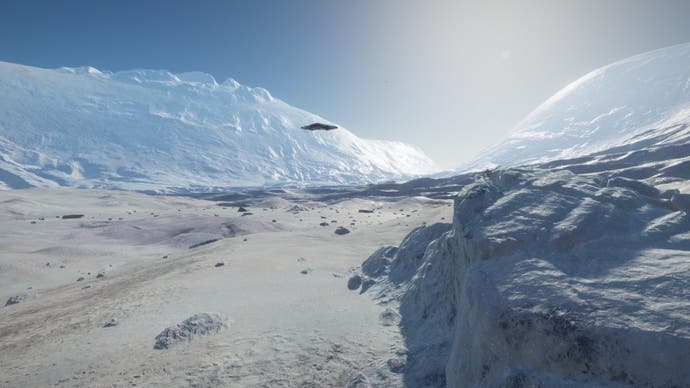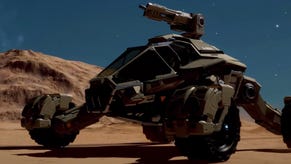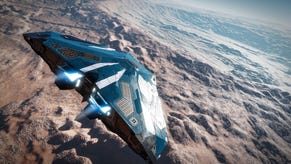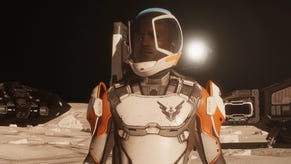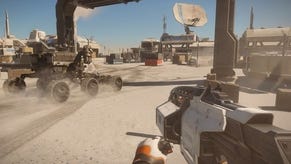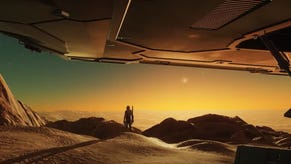Frontier on Elite Dangerous: Odyssey's four-decade journey from idea to foot-stomping reality
Shoe-shoe rocket.
It's been two-and-a-half years since Frontier Developments first announced it was working on the mysterious "next era" of Elite Dangerous - one which would, it promised, deliver a "defining moment" in the history of the game. That, we'd eventually learn, meant the advent of perhaps one of the most requested features in the seminal space sim series' near-four-decade-long existence - the ability for players to leave their ships and stomp across the galaxy in first-person - and today marks the day this once-enigmatic new expansion, now officially titled Odyssey, finally appears.
But how did the journey toward Odyssey's PC release begin? As Piers Jackson, game director on Elite Dangerous, explains, "You probably need to wind all the way back somewhere into the '80s and really look at [original co-creator David Braben's] vision for this. I think it's always been the case that, at some point, he wanted to get out of ships and walk on planets. So this is a long burn, shall we say, to get to that point."
It's a dream that countless Elite Dangerous players have shared over the years, and it's hard to overstate the thrill of finally, after four decades of cockpit confinement, being able to plant your feet on solid ground. "The thing that really took my breath away," recalls lead designer Gareth Hughes of his first time outside his vessel in Odyssey, "was just the sense of scale when you get out on foot. You got a little bit of that sensation when the SRV gameplay was added with Horizons but being able to see the scale of the ships, the scale of the settlements that we've made in Odyssey, the pre-existing settlements and ports, it's amazing just to look around and soak up exactly how big all this stuff is."
Odyssey's new planetary tech, which is capable of generating some stunning alien vistas, is certainly striking, but it's perhaps the expansion of the game's existing locations - such as the imposing, oft-visited space stations - that really underscores just how much of an attitude shift the change to first-person exploration brings. "It gives a slightly more human feel to it," believes Hughes. "You have a different connection, from being a pilot to being a human in this place".
"All the things you would have experienced at some level outside the station are now occurring at ground level," Jackson agrees, "and that's one of the real magic moments for me. When you're in multiplayer and you walk to the window, and you look out into the vastness of the hangar, and you watch your friend's ship come through the letterbox and dock, and actually descend into it, and then they pop out of the elevator at the other end and walk towards you."
There's more to Odyssey than the chance to ogle its mighty sights from a new perspective, of course. It also weaves first-person combat, non-combat missions, and expanded exploration into its on-foot gameplay, enabling players to experience some of Elite Dangerous' core tenets in whole new ways. "We needed to make sure we were creating something for everyone," explains Jackson. "Our players are pretty diverse, [as are] the activities they want to undertake in Elite, so we needed to make sure we were creating experiences in each of the areas".
"It was also important for us that the Odyssey content didn't feel separate from the game Elite is," adds Hughes. "It had to feel blended in, so there were meaningful connections between what you were doing in Elite Dangerous and what you're doing in the Odyssey expansion, so it feels like a natural progression rather than a completely separate layer of activity."
"There's a lot of systems in Elite up to the point of Odyssey that worked fantastically well," continues Jackson, "and our role as designers was to build upon that, to create new experiences that complement that. We now have new planets we can explore, we're out of an SRV or out of the ship and on foot, so there are new areas for us to layer on top of that. The challenge really for us has always been making sure these game systems actually link cohesively with each other."
"It also creates really nice opportunities to expand on some of the systems that are already in the game," adds Hughes. "So, for example, you can now fly down to our planetary settlements in a ship, dock with the landing pad, and you can trade with those guys. But because these are smaller settlements, rather than large ports, they often have small or medium landing pads which constrains the size of ship you can land with. So, we're embracing the trade elements a little bit from the existing game, but then we're feeding back into it by encouraging players to actually use a wider diversity of ships than perhaps they are at the moment. It's those kinds of connections we've really worked on to make sure that synergy is there... There's so many good and absorbing elements that are already there, it's really like, well, how can we take what is brilliant about this and transpose it into this on-foot experience?"
None of Odyssey's new systems are without precedent of course - even within the increasingly busy field of space sims, games like No Man's Sky and Star Citizen have already significantly pipped Elite Dangerous to the post with features like planetary landings, or first-person exploration and combat - but Jackson and Hughes believe the expansion successfully manages to give these familiar elements a unique, distinctly Elite spin.
Odyssey's combat - which comes into play during missions, emergent encounters, and competitive team-based Conflict Zones - is, reckons Hughes, a good example of this. "What we wanted to do was make a first-person combat experience that felt right for Elite," he explains, "so a lot of our inspiration actually came from the ship combat, the kinds of technology and weapon types and ammunition types we use there."
"[There's also] a little bit of respectfulness about the type of player we have who plays Elite," continues Hughes. "Not to be too general, but maybe they don't want an extreme twitch-based shooter that's really going to tax them... something slightly slower-paced, or what we consider to be more tactical, more strategic, felt like a better fit for us."
"That was critical from my perspective," Jackson agrees, "to create a thinking man's shooter. You can get into a lot of trouble in Odyssey pretty quickly by just walking into a settlement, pulling your guns out, and shooting. But if you are more considered in the way you approach the game, you can be slightly slower, more methodical. Or if you're really smart, you meet up with your friends and actually take missions on together."
"I think it opens up even more when we start talking about team play," continues Hughes. "If you've got players in a group on foot, you can certainly take on different roles. But that expands out even more if you've got a player [whose] preference is for ship gameplay, say, and they've got a friend who they've convinced to come in and enjoy Odyssey with them. That friend can be the on-foot guy, and they can be the ship guy, the getaway driver for that new player, and they can work together... We've certainly seen that in a lot of our playtesting and in the alpha."
While combat undoubtedly plays a significant role within Odyssey, however, the team, mindful of the diversity of Elite's player base, was keen to ensure the expansion mirrored the core game's fundamental sandbox ethos - "The galaxy is yours, do what you want with it", as Jackson puts it - never forcing players toward one particular style of play. "Outside of the Conflict Zones, which are dedicated combat spaces," Hughes elaborates, "we don't force combat on the player. It's pretty much a player's choice to want to fight or to do things that are going to make them have to fight... That was a conscious choice on our part... because [although combat is] certainly a pillar of the game, it's not about it happening 100 percent".
"We needed to make sure that was reflected in the sort of missions we're providing," adds Jackson, "so we have some quite lightweight entry missions, which are just a simple case of going somewhere and collecting something, and there's very little danger and very little friction involved in that. You can also take on some of our reboot missions - some of the most atmospheric ones we've got - where you go to power down settlements, maybe at night and it's pitch black, and you can be completely on your own, working more like a space mechanic... So there are activities that can occur at settlements that don't necessarily have to involve combat. But they can always deteriorate into combat, if that's how it unfolds."
Unsurprisingly, given Odyssey's focus on planetary enhancements and on-foot ambling, Jackson believes exploration is one non-combat area that particularly benefits from the expansion. "We're creating new planets - really, really pretty beautiful planets - for [players] to go and explore, to get out and walk about in, to go and sample new organic life forms. So there's a huge set of new things for our explorers to see in the galaxy. A lot of them will spend huge amounts of time traveling the black, looking at what they can find out there. They'll find things we've not seen [because of the game's procedural nature] and that's part of the wonder of exploration, you can literally find things that are new and no one's seen before."
The hope is these additions, whether combat-focussed or otherwise, will serve as jumping-off points for whole new emergent adventures each time players venture out into the galaxy. "If they're going to this system, this port," says Hughes, "they can take a mission and go to that nearby planet. And while they're there, they could do a little bit of trading, and they'll do their mission at the settlement, maybe they'll do a little bit of looting. And it's that chain of gameplay opportunity that creates a new story players haven't really experienced before.
"[They may think] 'When I did the scan of the planet before I flew down, I saw a massive patch of organics a couple of miles away. I'm going to hop over there and scan them all and then I can trade in my genetic data for extra cash'. But while I'm on my way to that organic field, I've come across a crashed ship, so I'm going to dip down and see if there's a scavenging opportunity. We're trying to create these links, opportunities for players they're never compelled to do. But if they want to, one thing leads to another and before they realise it they've done a little journey from ship gameplay, maybe through to SRV, to on-foot, back into ship, and then back to port. It's that kind of circular nature we're injecting more things into that people can enjoy."
Of course, many Elite Dangerous fans have already had an opportunity to put Odyssey's new systems to the test, thanks to Frontier's recent paid alpha. It was a process pitched as a chance to play the expansion early and offer meaningful feedback, but with just a few weeks between the alpha's conclusion and today's launch, was it - as some have posited - more of a marketing opportunity than one that could possibly ever hope to facilitate meaningful change?
"This was not a marketing tool," insists Jackson. "Certainly, from our perspective, we've used the alpha enormously, we've had a very large amount of feedback from our players, we've reacted to a lot of it as well." Hughes agrees, explaining, "From a design perspective, the data around the economy, combat balancing, AI behaviours, there was some fantastic insight we managed to get from the alpha and we've reacted to for launch. So I'm hoping the players who played and enjoyed the alpha are going to see some really significant improvements in the areas they've highlighted, that they felt needed them."
"And it doesn't stop there," Jackson adds. "We continue to listen to our players... Elite's a living, breathing game, it doesn't stop at release, we will continue to develop it."
One notable area of improvement Odyssey players will see at launch, unfinished during the alpha, is the expansion's new planetary generation technology. "We now have a much more diverse range of atmospheres with [variable] thickness to them," explains Jackson, "and the actual surfaces have had a massive amount of improvement. We didn't have many things like canyons in the alpha, but we've spent a lot of time making sure they're in there for people who want to do canyon runs, and the geology is just generally speaking significantly improved. It's like a massive lick of paint across the whole lot, and it already had been a step up from the planets that were in Horizons."
As for what may be in store for Elite Dangerous beyond today's launch, Frontier isn't saying. "I don't think we're in a position where we're ready to talk about what comes after Odyssey," Jackson says. "You know, there are a number of ideas floating around but we're very, very focused on launch right now. We will get launched, take a breath, see what comes next." As Jackson sees it though, Odyssey's new on-foot gameplay will continue to be a core part of the Elite Dangerous vision in the future. "In the same way ships are important to Elite," he confirms, "it's now important to Elite as well."
